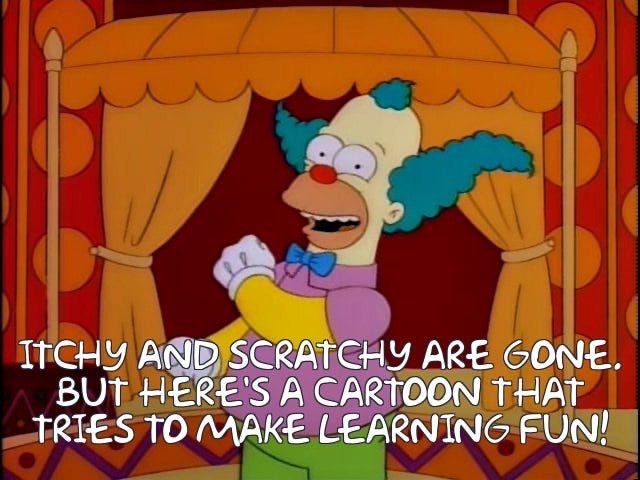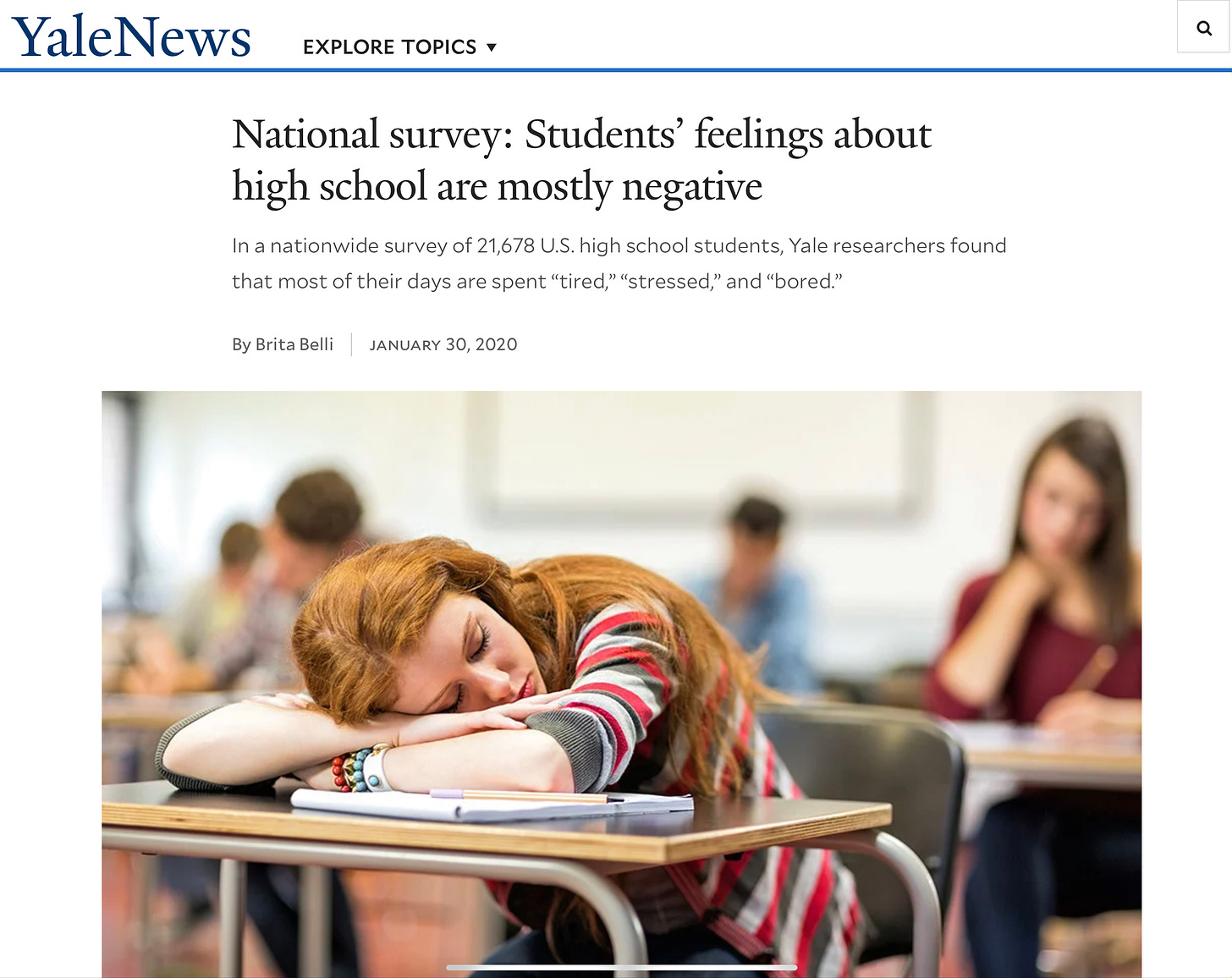Did I squeeze too much into the last post? I think I squeezed too much into that last post. And like an overfull PB&J, some of the gooeist stuff got lost.
Behold: the gooey squeezage!
(…yeah, I won’t be using that metaphor again.)
1: Is “meaningful” the same thing as “fun”?
Most assuredly not.
Fun doesn’t last long. It’s triggered by superficial activities; when they end, fun disappears. Meaning goes deep and lasts long. It aligns your insides with the outside world. And its changes can persist — the things you find meaningful in childhood can fuel your motivation for the rest of your life.
In education, meaning is the meal; fun is just frosting.
Imaginary Interlocutor: Is there a club for killjoys? Am I in the presence of their king? Should I kneel?
Ha! Yeah, as I read what I just wrote, I realize I sound like some sort of love child of Victor Frankl and Ebenezer Scrooge. That’s probably not an accurate image of me — as a teacher, I thrive on silliness. I weaponize nonsense. Next month, I’m hanging up a framed woodcut of Isaac Newton picking his nose.
Which is all to say: I love fun. It’s my personal style. It’s powerful to get kids to start paying attention… but it’s not what keeps their attention, years later. Only meaning does that.
I.I.: Why are you so skeptical of fun?
The track record of people making learning “fun” is not encouraging.
I.I.: Could fun serve some deeper role in education?
Yes, and I should really think more about that.
I don’t remember Egan using the word “fun” much, but he calls “humor” and “play” (which both feel pretty close to “fun”) two of the most powerful wrenches in Ye Ole Toolbox of Human Cognition.
Humor sets in early: as I type this, my 7-month-old daughter is giggling as she chases a purple foam roller across the living room floor. And it stays late: very, very funny adults can rack up a lot of Internet Celebrity Points (and, the urban legends tell us, maybe even make some money).
And play — well, play can unleash deep emotions. I should write more about this later — suffice to say that I think that the educational reform folk who call for more playfulness in education are onto something.
2: I loved school! What do you have to say to me?
I’m jealous.
I loved elementary school, survived middle school, and found sophomore year so boring that I left to homeschool myself.
And I think my experience is pretty typical. (Even the actually-leaving school part? More typical than you might think — only around 85% of Americans end up graduating high school, though “leaving for a year to teach yourself ancient Greek only to discover just how lazy you truly are” is obviously different than dropping out.)
But if your experience of school was the direct opposite and you think I’m the odd man out, ask some friends how they experienced it. And then talk to some of your former classmates who you weren’t friends with (birds of a feather flock together). And then ask poll some people who went to different schools, and who you’re not friends with now.
I.I.: Okay, I’ve done all those things, and have determined that I really did love school, along with 80% of my friends, 74% of my enemies, and 66% of the random people I hit up at the park, fusion restaurants, and strip malls. Have I disproven your thesis?
Well, maybe. Remember memory is often rose-colored: you might be disproportionately recalling the good times, and forgetting the tedium.
How could we past that? Some Yale researchers sampled students at random moments of class. What did they find?
Ask a high school student how he or she typically feels at school, and the answer you’ll likely hear is “tired,” closely followed by “stressed” and “bored.”
In a nationwide survey of 21,678 U.S. high school students, researchers from the Yale Center for Emotional Intelligence and the Yale Child Study Center found that nearly 75% of the students’ self-reported feelings related to school were negative….
High school students reported negative feelings 60% of the time.
“It was higher than we expected,” said co-author and research scientist Zorana Ivcevic. “We know from talking to students that they are feeling tired, stressed, and bored, but were surprised by how overwhelming it was.”
And that was before the pandemic.
I.I.: Harumph. For complicated reasons I’m choosing not to explain here, I still don’t believe that schools are such unpleasant places for students.
I should note that elementary school usually comes out as more enjoyable — so if you’re thinking back to your elementary school years, you might be right.
But even if you’re right — even if middle schools and high schools are happy places filled with happy students — remember that “happiness” wasn’t part of my thesis in the first place. Meaning was. To repeat the big thing:
The matter with schooling is that schooling doesn’t matter.
A story.
When I was out of college, and hungry to find a movement to help mend the world, I set myself to the task of grokking human well-being. I remember my excitement reading Martin Seligman’s book Flourish, which laid out his “PERMA” model of happiness. We go wrong, he said, when when imagine “happiness” to be a unified thing. If we look closely, we can see it lumps together at least five quite different things:
Positive emotion (think: putting on warm socks)
Engagement (think: clearing row after row in Tetris until you absolutely, positivelyneed to pee)
Relationships (think: the cameraderie you feel with the person who dislikes the same co-worker as you)
Meaning (think: spending hours crafting the perfect playlist for a 10-minute shower)
Achievement (think: the smug satisfaction of inserting a USB on the first try)
When you remember loving school, maybe it was because it was engaging, or it was a place to make good friends, or it was, I don’t know, full of warm socks.
I jest; all of these factors in “happiness” are crucial in creating new kinds of schooling. But the most important —
Hold up. That last point is important; it deserves more than to be immediately gutted with a “but”. Let’s give it its own fancy text block:
Positive emotion, engagement, relationships, meaning, and achievements are crucial in creating schools for humans.
Okay; my conscience is unburdened. (And there are reform moments associated with each — I should write more about those later.)
But of those five, meaning is king. When we help students experience what they’re learning as meaningful, we begin to change the world.
3: Does the teacher have to think what they’re teaching is meaningful?
Short answer yes, long answer hell yes.
We’re social animals: our minds are built to catch an understanding of what matters from others.
The conservative writer R.J. Snell put it well:
We learn to love
by imitating the love of others.
The conviction that something matters spreads like fire. A teacher who isn’t at least a little in love with what they’re teaching may be a compassionate person. They may be a competent manager of children. Their natural enthusiasm may win them a “teacher of the year” award. But they’re unlikely to spark a sense of meaning in their students.
I.I.: Are teachers, in their teacher training, taught to fall in love with what they teach?
First, a warning about epistemic status: According to a diploma floating somewhere around my basement, I have a master’s degree in something optimistically called “educational leadership”. I also sat through a class for future history teachers in my undergraduate degree (I couldn’t take it for credit, the college of education restricted its too-cool-for-school classes to majors).
That said, my actual lived experience of teacher training is pretty paltry — my master’s classes were mostly about theory-driven things, and I stopped attending the future-history-teacher class.
So: exercise the proper level of credulity for what I’m about to say.
Holy God in Heaven, no, no teachers are not taught to fall in love with what they teach.
The focus instead is on a mix of the cognitive (how can you help students abstractly understand what you want them to learn?) and the practical (have you thought about how you can use your bulletin boards? also, seriously, let’s talk about your bulletin boards). The emotional meaning of content is far, far away from what’s talked about in teacher training.
(The exception to this, of course, is the Master of Education program at Simon Fraser University that Egan set up, where teachers are taught how to first find a personal, emotional connection with the material, and then how to help bring students into that love.)
4: Should we get rid of worksheets and tests?
The first thing we do, let’s kill all the worksheets.
– Dick the Butcher, Henry the VI, Part II
No.
One of the weirdest things about Egan’s revolutionary vision is how un-revolutionary it can look. At first glance, it can look like normal schooling.
(Or it might most definitely not; some of the most exciting work continuing Egan’s tradition is in nature-based, outdoor, experiential learning.)
When my kids attended our local public school, I would cringe when I saw the worksheets they brought home. Shallow, soulless things, they pointed to an education that had no overarching vision of life.
But as a teacher, I use worksheets and tests all the time. (Here, an example.)
The sorts of skills kids need to thrive in the modern world aren’t natural, and require diligent practice. (Phonics, times tables, punctuation rules…) Worksheets and tests can be chockablock with meaning.
5: Do bacteria really have goals?
No.
Yes!
Well, it depends on how you define “goals”.
In the last post, I wrote:
These single-celled critters have no brains or nervous systems, and yet they behave surprisingly like people…. They act as if they’re observing their environment, looking for dangers and resources. They interact with each other and sometimes act as if they had a basic human morality — some act as if they’re attempting to cheat each other, some punish cheaters, and others observe what’s happening and just go on with their lives. When you get an infection, it’s because bacteriums have banded together in a literal battle formation.
We inherit from our distant ancestors our most unconscious, automatic, and powerful drives — goals like thirst, hunger, attachment, lust, fellowship, joy, fear, anger, compassion — and we develop abstract intelligence to help us achieve those goals better. Our nervous system is forever scorekeeping how we’re doing at meeting those goals.
I probably should have been more careful in my wording. Single-celled critters act like they have human goals, but literal “goals” require a nervous system able to represent stuff.
Turtles can do this — one brain module, prompted by hunger, calls up an image of a juicy bug; the visual cortex starts comparing what it sees with that image. (Rock? Not a bug. Different rock? Not a bug. Clipboard of neuroscience grad student? Not a bug.)
(I’m drawing this example from the book The Journey of the Mind by Ogi Ogas, which sounds like New Age drivel but is instead the most insightful book on neuroscience I’ve ever read, and one of the very best-written science books I’ve ever read.)
Bacteriums don’t have any of that — all they have are molecules. But, dang it, they act as if they do. “Competence precedes comprehension”, as Daniel Dennett put it. We need to turn our thinking about thinking upside down; evolutionarily, the purpose of thinking isn’t to memorize apostrophe rules, it’s to thrive in a harsh world.
I.I. Are you against memorizing apostrophe rules?
Oh, I’m incredibly in favor of memorizing apostrophe rules! (Just finished a lesson on ‘em last week, actually.) But if you want people to learn how to use an apostrophe, you need to help them feel how apostrophes matter — a story which involves cavemen, a Viking invasion, and two friends who tried to save the world.
Once something matters, the memorization becomes a whole lot easier.
6: What matters? (What should be taught in school?)
Yeah… this is the big question, innit? At least, it’s the question I spend most of my time thinking about.
Egan did, too. Half of his work was pointed at helping teachers use these kinds of understanding and cultural–cognitive tools to help their kids find learning meaningful, but half was in thinking through what the K–12 curriculum could look like, if it were rejiggered to take best advantage of how humans really learn.
(Another half was trying to understand how these tools and kinds of understanding had come into existence in the first place. And another half was working to master fractions. Busy guy, Egan.)
I’m a fan of his answer. A big fan. And I’ll start sketching out his vision — of what schooling could look like, if we put a premium on meaning — in the next post.







